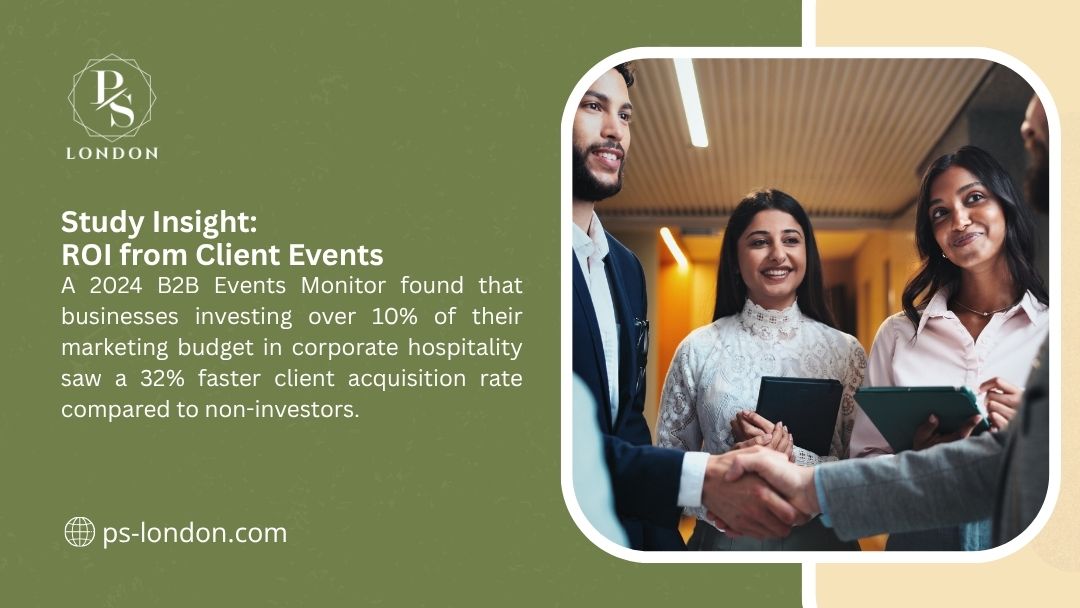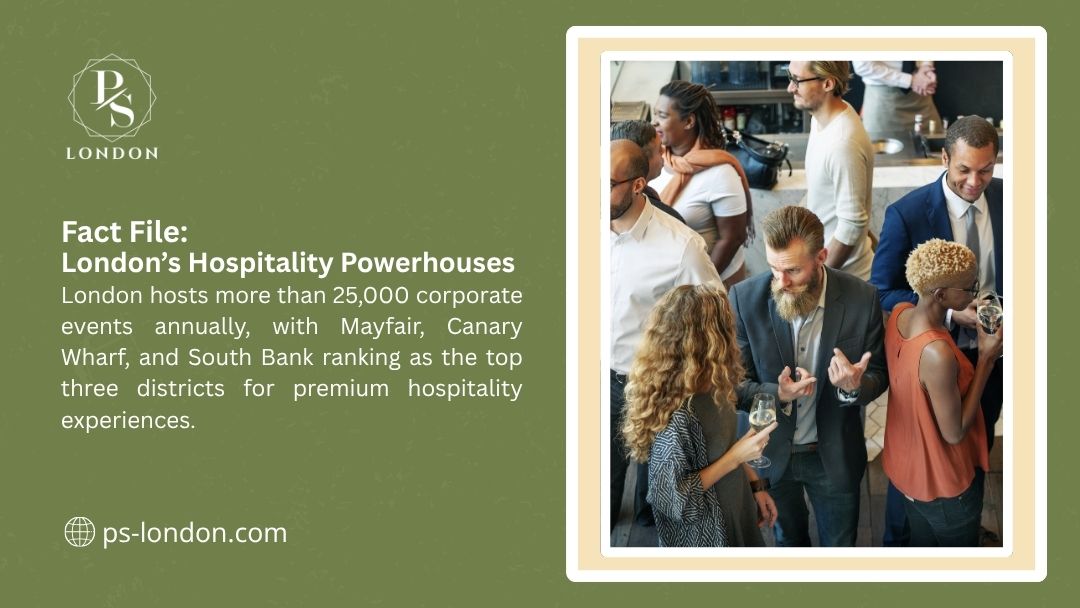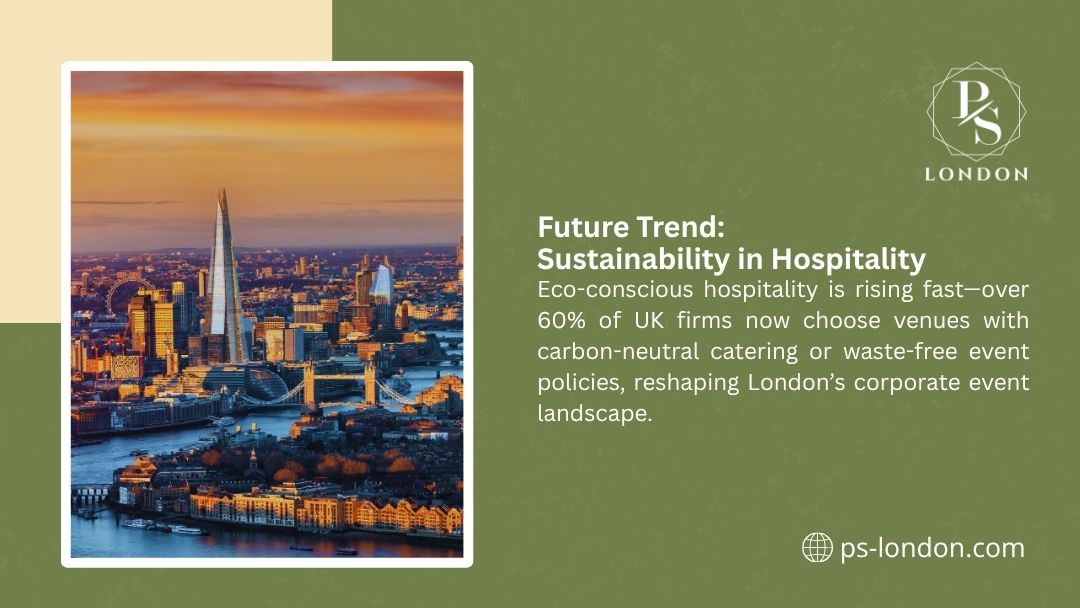Corporate hospitality has become one of the most strategic tools for relationship-driven businesses in London. The UK hospitality market contributes over £93 billion to the economy annually and supports more than 3 million jobs, with corporate events forming an estimated 12–15% of that total.
London alone hosts thousands of business-oriented experiences every year, from private dining to major sports suites, making it a leading city for client entertainment and partnership building.
This guide explains in straightforward terms what corporate hospitality means, why it matters, how it fits into the broader industry, and how London-based firms such as P.S. London deliver it at a personal, professional level.
By the end, readers will understand how to measure value, identify event types, and plan programs that strengthen business relationships rather than just fill calendars.
What Is Corporate Hospitality?
Corporate hospitality refers to the way companies host or entertain clients, prospects, partners, or employees at professionally arranged events paid for by the business. The goal is to strengthen relationships, show appreciation, and create a memorable experience that opens commercial opportunities.
Unlike ordinary social events, corporate hospitality connects directly to business strategy. It may take place at a sports match, a private dinner, or a cultural evening, but its true purpose is to create goodwill and open conversation outside the boardroom.
Across London, the market for corporate hospitality companies has grown steadily as brands look for more personal ways to retain clients and motivate teams. A 2024 study by VisitBritain noted that business-related leisure spending in London rose by 28% compared with pre-pandemic levels, driven largely by high-end event programs and corporate hospitality packages.
Why Is Corporate Hospitality Important?
The importance of corporate hospitality lies in its ability to humanise business. Numbers alone rarely close deals; trust does. Shared experiences build that trust faster than any slide deck.
A recent Ipsos Business Research survey found that 73% of decision-makers say they feel more loyal to brands that invite them to well-planned hospitality events. For internal audiences, the same logic applies: teams that share off-site experiences report up to 30% higher morale and 22% lower turnover.
Well-executed corporate hospitality is also a differentiator. In markets where competitors offer similar prices or services, hospitality signals refinement and attention to detail. It shows clients they are valued partners, not line items in a CRM system.
For London firms, where relationships drive everything from finance to creative industries, corporate hospitality is no longer optional; it is an extension of brand reputation.
How Corporate Hospitality Fits Within the Hospitality Industry
Corporate hospitality operates inside the wider hospitality industry, which in the UK is projected to exceed £120 billion in value by 2030. It sits between event management and client relationship management, where service meets strategy.
Position of Corporate Hospitality in the UK Industry
| Sector | Description | 2024 Market Estimate |
| Hotels & accommodation | Traditional lodging, conferences, travel stays | £47 billion |
| Food & beverage venues | Restaurants, bars, private dining rooms | £38 billion |
| Events & leisure | Corporate and public events, ticketed experiences | £24 billion |
| Corporate hospitality | Business-driven hosting within other sectors | £11–13 billion |
The scale matters because it shows how corporate hospitality touches multiple sub-industries. A single program may combine hotel stays, fine dining, and cultural visits. This complexity is why concierge-led providers such as P.S. London hold an advantage; they manage every piece rather than outsourcing each part.
Benefits of Corporate Hospitality for Your Business
Corporate hospitality generates measurable and intangible returns alike. Financial impact appears through client retention, upselling, and faster deal cycles, while softer metrics show in morale and brand affinity.
Key Business Benefits
| Benefit | Typical Result | Supporting Figure |
| Client retention | Clients feel valued and renew contracts | Bain & Co: 5 % higher retention → 25 % more profit |
| New business | Guests bring referrals and introductions | EventTrack 2024: 42 % of attendees shared a new lead post-event |
| Employee engagement | Team bonding through shared experiences | UKHospitality Report: +28 % morale boost after reward events |
| Brand perception | Seen as premium, attentive, trustworthy | 7 of 10 executives associate consistent hospitality with prestige |
| Community & PR | Local partnerships and press coverage | London & Partners: Corporate events generated £1.2 billion in tourism revenue in 2023 |
For companies balancing budgets, these numbers confirm that hospitality isn’t indulgence—it’s strategy.

Common Types and Examples of Corporate Hospitality Events
Corporate hospitality covers every occasion where a company hosts others for business purposes. The most effective programs use a mix of sports, culture, dining, and leisure to match guest interests.
1. Sports Events and VIP Suites
Sports remain the backbone of corporate hospitality, especially in the UK. Premier League hospitality packages, Wimbledon boxes, or rugby fixtures at Twickenham combine competition with conversation.
Sports Hospitality Snapshot
| Metric | Data |
| Average corporate box cost (Premier League) | £6,000–£12,000 per match |
| Return guests year-on-year | 68 % |
| Most requested city | London (football, cricket, tennis) |
These experiences deliver relaxed networking settings where clients engage naturally.
2. Fine Dining and Culinary Experiences
Corporate dining has shifted from standard banquets to experiential gastronomy. Michelin-star tasting menus, chef’s tables, and curated wine evenings are now preferred. Companies often reserve private rooms in new restaurants in London, securing exclusivity without distraction.
Dining Event Overview
| Factor | Typical Range |
| Average spend per guest | £150–£400 |
| Ideal group size | 8–12 guests for conversation flow |
| Booking lead time | 4–6 weeks for premium venues |
3. Cultural and Lifestyle Events
Art openings, theatre premieres, or tours of hidden gems across London provide refined alternatives to high-energy sports. Cultural events attract clients who prefer privacy and intellectual conversation over noise.
Cultural Event Stats
| Measure | Insight |
| Growth of cultural corporate bookings (2022-24) | +33 % |
| Average attendance | 15–25 guests |
| Popular add-ons | Private guides, transport, and after-show cocktails |
4. Team-Focused Hospitality
Internal hospitality builds community. Off-site days in West London or activity-based weekends align with staff recognition and team-building goals.
Employee Hospitality Outcomes
| KPI | Typical Change After Event |
| Job satisfaction | +25 % |
| Staff retention over 12 months | +18 % |
| Cross-department collaboration score | +20 % |
These examples show how corporate hospitality adapts to the audience, not the other way around.
How to Judge the Impact of Corporate Hospitality
Return on investment is often debated, yet consistent frameworks exist. Businesses track both quantitative and qualitative data to show impact beyond the immediate event.
Measuring Effectiveness
| Category | Sample Metric | Evaluation Period |
| Sales outcomes | Number of contracts renewed or upsold | 3–6 months |
| Client pipeline | Referrals or introductions from attendees | 6–12 months |
| Employee outcomes | Engagement surveys post-event | Quarterly |
| Public image | Mentions in media or social platforms | 30 days post-event |
A 2024 Deloitte report found that firms integrating hospitality into CRM systems recorded 19% faster deal closure rates and 12% higher average deal values. When hospitality is managed through a dedicated team or concierge partner, results stay consistent rather than sporadic.
Where Corporate Hospitality Sits in the London Landscape
London’s mix of finance, fashion, media, and tech creates ideal conditions for corporate hospitality. The city hosts over 300 major business events every week, supported by more than 1,600 venues and 70 Michelin-starred restaurants.
Clients visiting the capital have endless choices, from curated cultural nights in Covent Garden to relaxed post-meeting drinks at one of the best bars in London. For high-profile executives, the city’s connectivity enables same-day transitions between conferences, private dinners, and entertainment.
This density, however, brings complexity. Venues book out months in advance, traffic patterns shift daily, and guest expectations rise yearly. Companies that attempt to manage hospitality internally often face logistical strain. That is why concierge partners such as P.S. London have become central to the city’s business culture.
Their insider access, from private club entries to premium transport coordination, transforms London from a logistical challenge into a seamless itinerary that impresses international guests.

How P.S. London Handles Corporate Hospitality Programs
P.S. London operates as a boutique concierge specialising in corporate and private programs exclusively within the capital. Every plan starts with a conversation about goals, relationship growth, brand image, or team reward, and builds from there.
P.S. London’s Core Approach
| Stage | What Happens |
| Discovery | Consultation to define audience, tone, and measurable outcome |
| Design | Selection of venues, corporate hospitality events, dining reservations, and unique elements such as private London tours |
| Coordination | Scheduling, communication, and transport are handled by one point of contact |
| Delivery | On-site hosting and live adjustments for timing or guest needs |
| Review | Post-event report covering satisfaction and follow-up recommendations |
Clients can integrate these services into broader programs using P.S. London’s itinerary planner, which links hospitality to the rest of a visit or conference. For corporate dining, dedicated reservations ensure every guest experiences London’s culinary scene without delays or etiquette worries like tipping in London restaurants.
For long-term partners, annual calendars replace one-off bookings. The same relationship manager oversees each event, maintaining consistency while introducing new venues and experiences throughout the year.
How Corporate Hospitality Links to Employee Experience and Jobs
Beyond external relationships, corporate hospitality sustains a large share of the UK’s employment base. The sector supports approximately 1 in 10 working adults nationwide. In London alone, event and hospitality roles account for over 400,000 jobs, ranging from planners to service staff.
Within companies, internal hospitality helps create a better work environment. Reward events, off-site dinners, and milestone celebrations act as public recognition. According to CIPD workplace data, firms that budget at least 2% of annual payroll for such activities report a 21% improvement in employee satisfaction scores.
For younger professionals entering corporate hospitality jobs, exposure to client-facing experiences builds interpersonal and project-management skills faster than classroom training. These roles bridge communication between operations, marketing, and executive teams, which explains why career growth in this field remains steady despite automation in other sectors.

Building Future Partnerships Through Corporate Hospitality in London
Corporate hospitality has evolved from a marketing luxury into a relationship investment. For businesses operating in London’s competitive environment, it now forms a measurable part of long-term client retention, staff loyalty, and brand differentiation.
When done with insight and precision, corporate hospitality turns every shared moment into business capital. A thoughtful itinerary, fine dining, or bespoke event does more than entertain; it builds trust that compounds over the years.
London offers the venues; P.S. London provides the access and execution. From tailored itineraries to full corporate concierge service, the team crafts programs that match your company’s tone and goals while leaving guests with an experience only a local insider can produce.
Start planning your next client engagement or team reward through P.S. London’s corporate concierge service and discover how curated hospitality can turn professional relationships into enduring partnerships.




